Have you ever noticed a strange burning smell coming from your blender while whipping up your favorite smoothie or sauce? Trust me, you’re not alone. Many blender owners have experienced this puzzling and slightly concerning issue. But fear not! In this article, we will delve into the reasons behind why your blender smells like burning and provide some helpful tips to keep your blending experience odor-free.
So, let’s dive in and uncover the secrets that lie beneath the smoky scent wafting from our beloved kitchen appliances!

Short Answer: Reasons why your blender smells like burning:
- Overloading: If your blender is overloaded, a burning smell may come from the couplers.
- Food Buildup: In case the food is not properly blended and becomes stuck around the blade, it can obstruct the blade and produce a burning smell.
- Blending For Too Long: Blending for too long can make your blender get too hot and start to smell like burning.
- Lack Of Liquid: Due to lack of liquids, your blades will become stuck as a result, and you’ll experience a wave of burning smell.
- Dull Blades: Putting too much ice or hard items in a blender with dull blades can strain the motor and cause a burning smell.
- Worn Out Brushes: Old blenders may produce a burning smell and smoke due to worn-out brushes caused by long-term use.
- Torn or Cracked Gasket: If your gasket is torn or cracked, it can let food get into the motor and cause a short circuit.
7 Reasons Why Your Blender Smells Like Burning
Blenders have become an essential kitchen tool for whipping up delicious smoothies, soups, and sauces in a jiffy. However, when they start emitting a distinct burning smell, it’s important to identify the root cause before it leads to potential damage or safety hazards. So let’s get to the bottom of why your blender smells like burning and find out how to fix it!
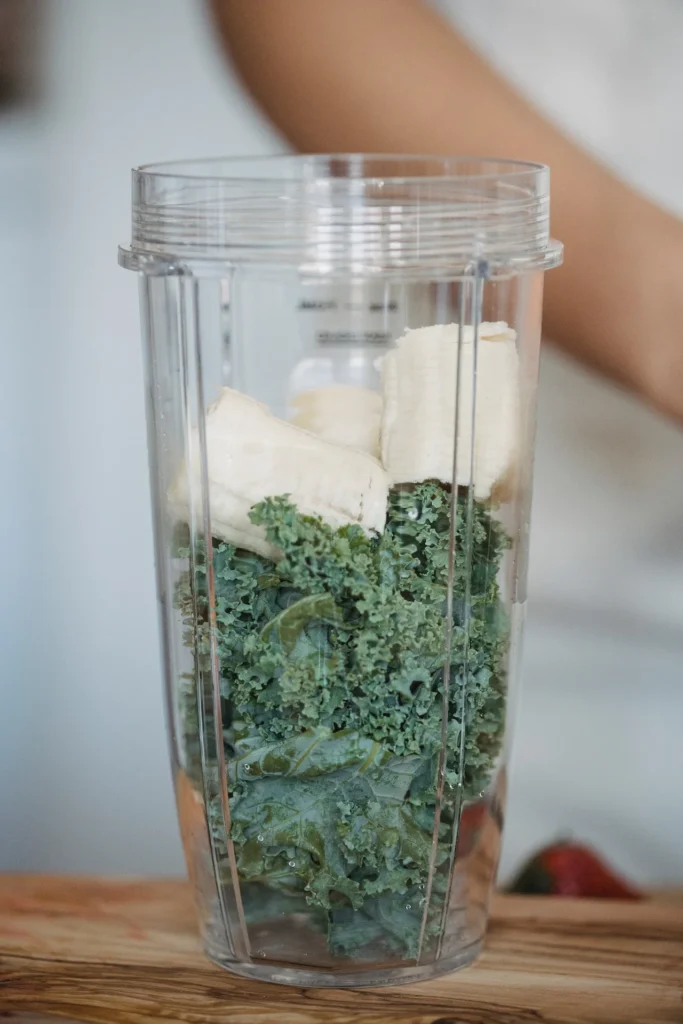
01. Overloading the Blander
When using a blender, it’s important to be mindful of the amount of ingredients you’re adding. Overloading the blender can put excessive strain on the motor, leading to various issues, including a burning smell. The couplers, which are the parts that connect the motor to the blender blades, can become overheated when the motor is forced to work harder than it should.
Overloading the blender can cause the motor to draw more current than it can handle, leading to overheating. As a result, the couplers may start to emit a burning smell. This smell can be an indication of the motor struggling to function properly and can potentially lead to more severe damage if not addressed.
To avoid overloading your blender, it’s essential to follow the manufacturer’s guidelines regarding maximum capacities. Additionally, it’s advisable to chop ingredients into smaller pieces before blending to ensure smoother and more efficient blending without putting excessive stress on the motor.
02 Food Buildup
Improperly blended food can sometimes accumulate and get stuck around the blades of the blender. This can happen if the ingredients are not adequately processed or if the blender is not powerful enough to handle certain types of food. When food buildup occurs, it can obstruct the movement of the blades, resulting in the motor straining and emitting a burning smell.
When food becomes stuck around the blade assembly, it can create a blockage that prevents the blades from rotating freely. As a result, the motor has to work harder to continue blending, leading to overheating. The burning smell is often caused by the excess heat generated as the motor struggles to operate under these conditions.
To prevent food buildup, it’s crucial to ensure that the blender is properly assembled before use and that the ingredients are adequately processed. Cutting ingredients into smaller pieces and adding enough liquid can help facilitate smoother blending and minimize the risk of food getting stuck around the blades.
Recommended Read: Debunking Myths: Does Blending Destroy Fiber?
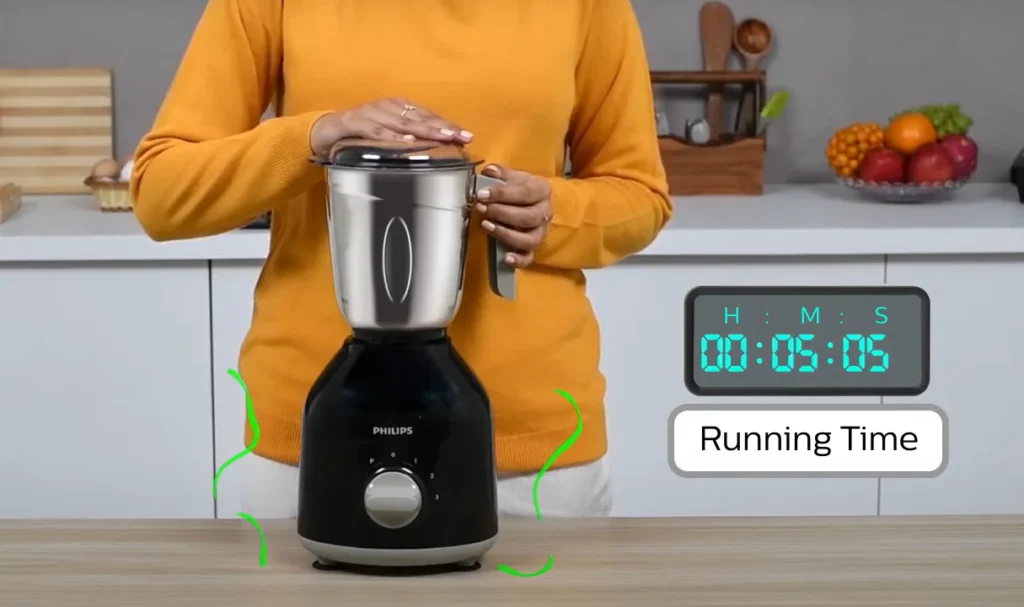
03 Blending for Too Long
Blending for an extended period can also contribute to a burning smell in blenders. While blenders are designed to handle a range of blending tasks, running the blender continuously for an extended duration can cause the motor to overheat. This excessive heat buildup can produce a burning smell and potentially damage the blender’s internal components.
To avoid overheating the blender, it’s important to follow the recommended blending durations provided by the manufacturer. If you need to blend for longer periods, it’s advisable to give the motor a break between blending cycles to allow it to cool down. This practice can help prevent excessive heat buildup and the associated burning smell.
04 Lack of Liquid
When using a blender, it’s important to make sure that the ingredients have the right amount of liquid. If there isn’t enough liquid, it can slow down the mixing process and put more stress on the blender’s motor, which could lead to a burning smell.
Blenders need liquid to make a swirl that moves the ingredients around and mixes them well. If there isn’t enough liquid, the motor may have trouble turning the blades easily, which causes more friction and heat. The smell of burning could be because the motor is working too hard to mix the ingredients.
To avoid this issue, it’s important to follow the recipe instructions and ensure that the recommended amount of liquid is added to the blender. This will facilitate the smooth movement of the blades and help prevent excessive strain on the motor, reducing the likelihood of a burning smell.
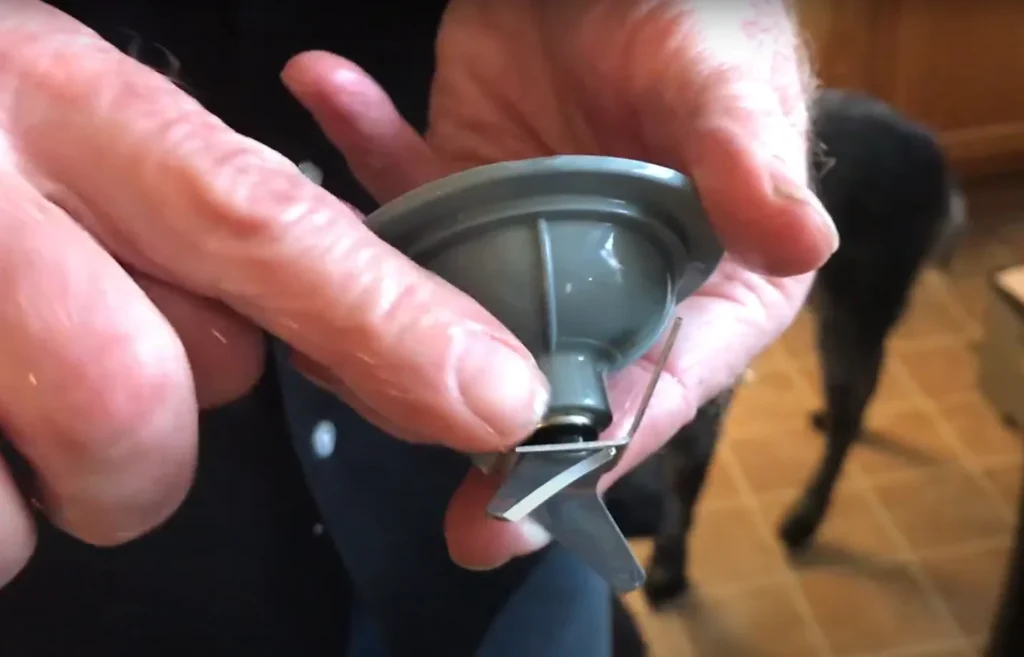
05 Dull Blades
Blender blades can become dull over time with regular use, especially when they encounter hard ingredients such as ice or fibrous produce. When the blades are dull, they are less effective at cutting through tough materials, resulting in increased resistance and strain on the blender’s motor. This strain can lead to overheating and the production of a burning smell.
When dull blades encounter hard items, such as ice cubes, they require more force to break them down. This increased force places a greater load on the motor, causing it to work harder and potentially overheat. The burning smell is a warning sign that the motor is being pushed beyond its intended limits.
To prevent this issue, it’s important to regularly check the condition of the blender blades and replace them if they become dull. Additionally, when blending frozen fruits or hard items, it’s advisable to use smaller quantities and give the blender breaks between blending cycles to avoid excessive strain on the motor.
Recommended Read: Unlock The Secrets: How To Sharpen Blender Blades?
06 Worn Out Brushes
In older blenders, the motor is typically equipped with brushes that come into contact with the armature to transfer electrical current. Over time, these brushes can wear out due to prolonged use, leading to reduced efficiency and potential issues such as a burning smell or even smoke.
When the brushes wear out, they may not make proper contact with the armature, resulting in increased electrical resistance and heat generation. The burning smell can indicate the presence of overheating components and the potential for further damage to the motor.
If you notice a burning smell or smoke coming from your blender, it’s advisable to unplug it immediately and have it inspected by a qualified professional. In some cases, the worn-out brushes may need to be replaced to restore the blender’s functionality and eliminate the burning smell.
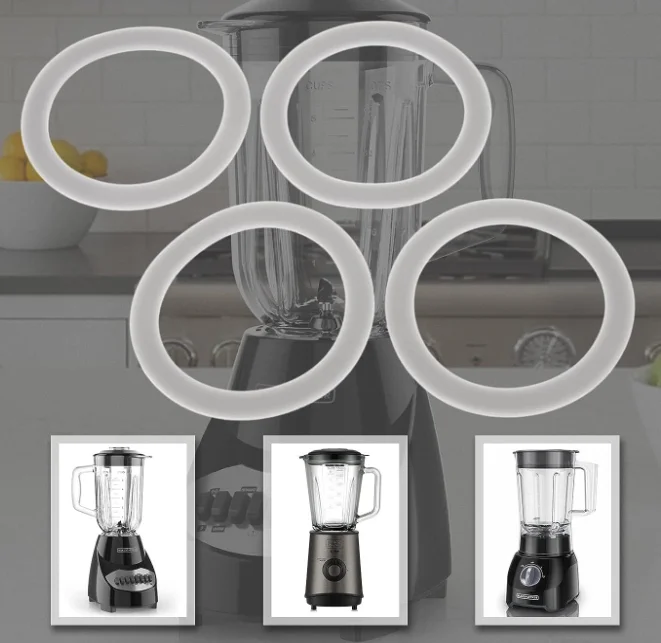
07 Torn or Cracked Gasket
If your gasket is torn or cracked, it can let food get into the motor and cause a short circuit.
The gasket in a blender acts as a seal between the blade assembly and the blender’s container, preventing liquids and food particles from entering the motor area. However, if the gasket becomes torn or cracked, it can compromise the integrity of the seal and allow food to enter the motor compartment, potentially causing a short circuit.
When food particles or liquids make their way into the motor, they can disrupt the electrical connections and create a short circuit. The short circuit can generate heat and emit a burning smell as the electrical components are affected.
To avoid this issue, it’s important to regularly inspect the gasket for any signs of damage and replace it if necessary. Properly maintaining the gasket ensures a tight seal and minimizes the risk of food or liquids reaching the motor. If you notice a burning smell or suspect a damaged gasket, it’s advisable to discontinue use and have the blender checked by a professional to prevent further damage.
How do I stop my blender from smelling?
To prevent your blender from smelling, make sure to avoid overloading it with ingredients. Follow the manufacturer’s guidelines for maximum capacities and chop ingredients into smaller pieces before blending. Additionally, clean the blender thoroughly after each use to remove any food residue that can cause odors.
Does new mixer smell like burning?
It is not uncommon for a new mixer to emit a slight burning smell during the initial few uses. This smell is often due to the heating of certain components, such as motor brushes, that need to settle in. It should dissipate after a few uses. However, if the smell persists or becomes strong, it’s advisable to contact the manufacturer for further assistance.
Is it normal for a blender to smoke?
No, it is not normal for a blender to produce smoke. If you notice smoke coming from your blender, it indicates a potential electrical issue or a malfunctioning motor. Immediately unplug the blender and discontinue use. Contact the manufacturer or a professional technician to inspect and repair the blender.
Can a blender overheat?
Yes, a blender can overheat if it is used continuously for an extended period, if the motor is overloaded, or if there is a malfunction in the motor or other components. Overheating can cause a burning smell, and it is essential to unplug the blender and allow it to cool down before using it again. Avoid overloading the blender and follow recommended blending durations to prevent overheating.
How long should a blender last?
The lifespan of a blender can vary depending on factors such as quality, usage frequency, and maintenance. However, a well-maintained blender from a reputable brand can typically last for several years, ranging from 5 to 10 years or even longer. Regular cleaning, proper use, and timely replacement of worn-out components can help extend the lifespan of your blender.
Final Verdict
In conclusion, a burning smell coming from your blender can be concerning but is usually easily solvable. By following the tips mentioned above you can prevent that unpleasant odor from occurring. Remember to also use caution when blending hot liquids and never leave your blender unattended while in use. If none of these solutions work and the burning smell persists, it may be best to consult a professional or consider replacing your blender. With proper care and maintenance, you can keep your blender smelling fresh and functioning properly for many delicious recipes to come. Happy blending!
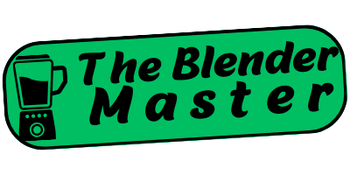

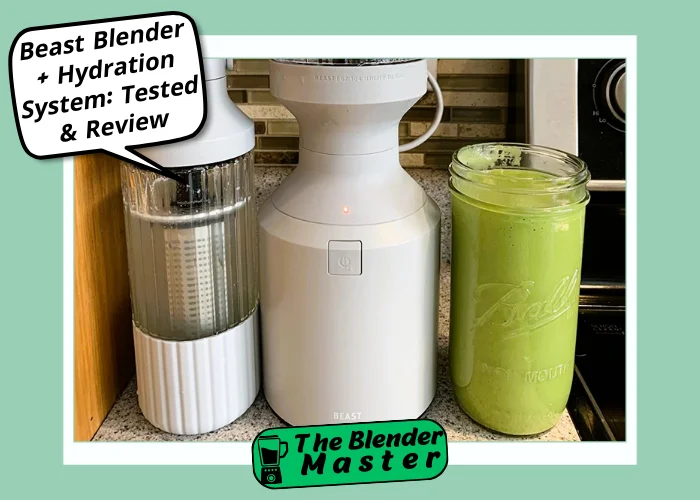
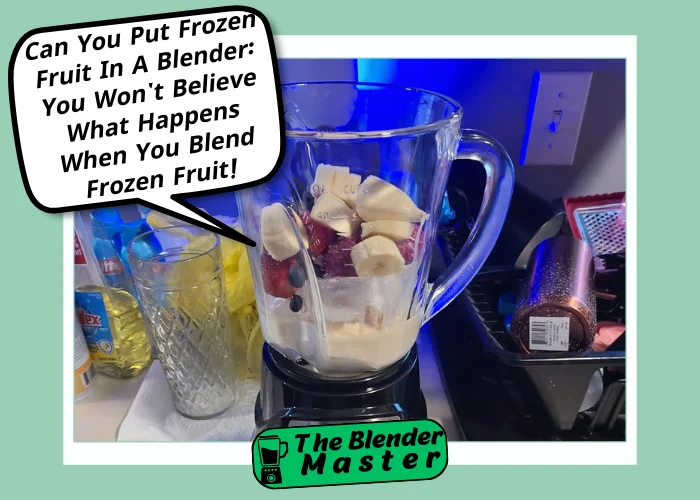
Leave a Reply